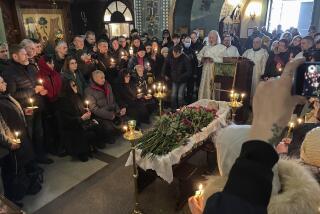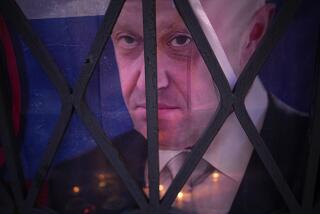Yeltsin Withdraws Honor Guard From Lenin’s Mausoleum : Moscow: The soldiers’ ritual was a Red Square fixture. There are rumors the Bolshevik leader’s body may be buried.
- Share via
MOSCOW — The goose-stepping soldiers who mounted a 24-hour honor guard at Lenin’s tomb were abruptly removed by presidential order Wednesday as Boris N. Yeltsin pressed his crackdown against the legacy of communism.
Police officers who replaced the soldiers outside the squat stone vault on Red Square said there were rumors the embalmed body of revolutionary V. I. Lenin, housed in a glass coffin inside, might be taken out and buried.
“Now we’ll just wait for the next decree from the president,” a gray-coated major said.
Lenin’s goateed corpse was on view as usual Wednesday in its air-conditioned, dimly lit chamber, but police said they did not know what might happen today.
The Russian Communist’s burial, which for many Russians would crown the passing of the political and economic order he forged before dying in 1924, seemed imminent two years ago as the Soviet Union broke up. But wary of provoking millions of Russians when there were plenty of other reasons for discontent, the Yeltsin leadership balked.
After crushing an armed rebellion led by a Communist-and-conservative-dominated Parliament this week, Yeltsin may have put the interment of the holiest relic of communism back on the agenda.
In an extraordinarily tough speech Wednesday, he said the system of workers’ and peasants’ councils--the soviets--that Lenin’s Bolsheviks exploited to seize power in 1917 “has been totally negligent of the security of the state and the safety of its citizens, thus closing the books on its own political career.”
According to witnesses Wednesday, instead of the normal hourly changing of the guard, at 4 p.m. the soldiers locked the metal doors to the mausoleum, waved at people and walked away.
The guard, furnished by the special Kremlin regiment, was withdrawn due to a “change in ritual,” the Itar-Tass news agency said.
In the evening, about 100 Russians and foreigners, including reporters and TV crews, clustered outside the dark-red granite building that bears the name Lenin in inlaid letters, wondering what the disappearance of the soldiers with their gleaming, bayonet-tipped rifles meant.
“We have become sheep!” one 58-year-old Moscow woman objected. “Lenin is part of our history. You can’t just cross out history. Look at all the people Mao (Tse-tung) killed in his Cultural Revolution. Did the Chinese pull him out of his mausoleum?”
A trio of teen-agers listened silently to the upset woman, then said they thought that on the whole, Lenin did more harm than good. “But if they’ve removed the guard it’s too bad,” said Kostya Shirayev, 19, a visitor from Ukraine, “because it was such a pretty ritual.”
In a bit of clockwork pageantry seen by countless tourists, exactly 2 minutes and 45 seconds before the hour the relieving sentries would quit the Spassky Gate of the Kremlin. Marching in high-kicking, Prussian style, they would arrive at the mausoleum’s double door and, with flawless timing, take up positions facing each other precisely as the tower chimes began tolling the hour.
For the next 60 minutes, they would stand stock-still.
More to Read
Sign up for Essential California
The most important California stories and recommendations in your inbox every morning.
You may occasionally receive promotional content from the Los Angeles Times.













